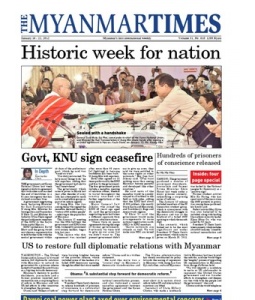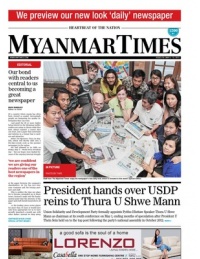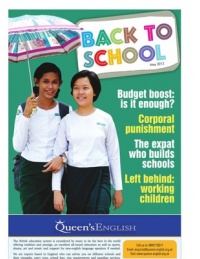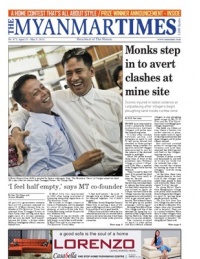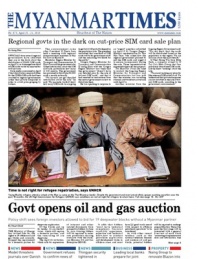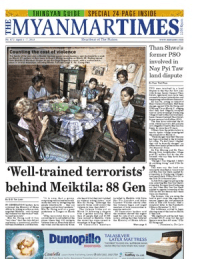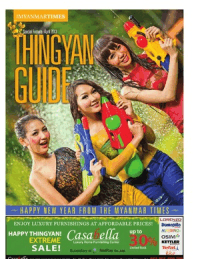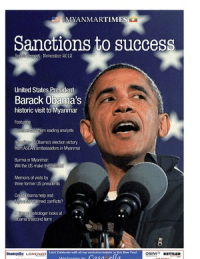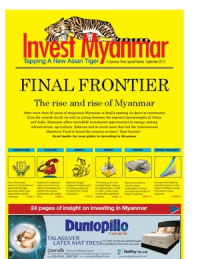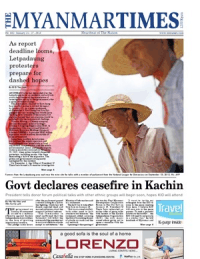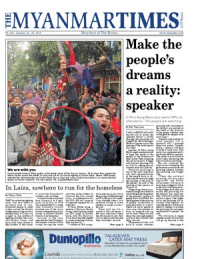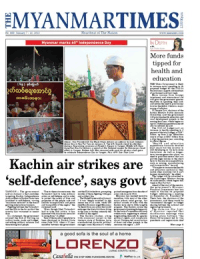myanmar
times
t H e
January 16 - 22, 2012
Myanmar’s first international weekly Volume 31, No. 610 1200 Kyats
By Hla Hla Htay
YANGON – The governmentpardoned a number of prominent dissidents, journalists and formerPrime Minister KhinNyunt last week under amajor prisoner amnesty,intensifying a surprisingseries of reforms.The January 13 releaseincluded members of the 88Generation student group,which is synonymous withthe democratic struggle inMyanmar and was at theforefront of a failed 1988uprising in which thousandsdied.The amnesty, whichlooked set to be the mostsignificant yet underPresident U Thein Sein’sgovernment, which came topower on March 30, 2011,was hailed by the NationalLeague for Democracy as a“positive sign”.Former student activistMin Ko Naing, who hasspent most of the years sincethe 1988 protests in prison,was among those pardoned,his family said.Fellow activist Htay Kywewas also believed to beincluded, along with leadingShan ethnic minority leaderKhun Htun Oo, who was jailed for 93 years.President U Thein Sein’slatest amnesty, which includesabout 650 inmates, “aimed fornational reconciliation andTHE government and KarenNational Union last weeksigned an historic agreementthat both sides said markedthe end of hostilities in a62-year insurgency that hasclaimed countless lives. A government negotiatingteam featuring Ministerfor Rail TransportationU Aung Min, Minister forImmigration and PopulationU Khin Yi and Minister forIndustry U Soe Thein signedthe pact with senior membersof the KNU in the KayinState capital Hpa-an.KNU spokesman DavidHtaw said the group wouldnow choose a representativeto hold further talks with thecentral government within45 days of the preliminarypact, which he said was“based on trust”.“Our duty just started. Wehave many things to do,” hetold reporters, adding thatthe government had shown“real benevolence”.The government, whichcame to power in March lastyear after decades of armyrule, has attempted to reachout to armed ethnic groups aspart of its reform agenda.U Aung Min, who wasamong those who signed theceasefire, declared the day a“victory of 60 million people”– referring to the populationof Myanmar.The January 12 meetingwas the fifth between thegovernment and KNU sincetalks, brokered by prominentcivil society leaders, beganlate last year.“The reason why thisagreement was reachedafter more than 60 years[of fighting] is becauseconfidence has been built,”U Aung Min told reporters.Both sides agreed on 11items put forward by the KNUand four by the government.The four government pointsinclude a ceasefire, openingof relations offices, freedomto travel throughout thecountry unarmed andfurther negotiations at theunion level.Major General SawJohnny, who joined theKNU 48 years ago aged16, said the governmentnegotiating team had takena different approach fromprevious administrations.“There were no peaceagreements during the reignof former governments.Previously we were toldto give up our arms butwe didn’t want to. Thepresent government didn’tsay to give up arms; theysaid we were entitled tothe same rights as othernationals,” Maj Gen SawJohnny said. “[We] wantnothing more than seeingMyanmar become peacefuland developed like othercountries.”He said news of theceasefire would be quicklyrelayed to all soldiers in thefield on both sides, addingthat the KNU had about10,000 soldiers, who mostlylive in Kayin and Mon statesand Tanintharyi, Bago and Ayeyarwady regions.U Khin Yi said thegovernment would makearrangements to issuenational registration cards(NRC) to KNU members.“Kayin nationals arecitizens as well. We willmake sure NRC are issued
Govt, KNU sign ceasefire
Hundreds of prisonersof conscience released
Historic week for nation
Sealed with a handshake
General Saw Mutu Sai Pho, commander-in-chief of the Karen National Union,and Minister for Rail Transportation U Aung Min shake hands after signing aan initial agreement in Hpa-an, Kayin State, on January 12.
Pic: Kaung Htet
More page 4More page 4More page 4
WASHINGTON –
The UnitedStates said on January 13 it wouldrestore full diplomatic relationswith Myanmar to reward itsgovernment for a prisoner releasehailed by President Barack Obamaas a big step towards democracy.Myanmar’s decision to pardondissidents, journalists and aformer premier injected newmomentum into a surprising flurryof reform in Myanmar and intoUS-led efforts to offer incentivesto strengthen the process.Obama said “flickers of reform”were burning brighter becauseof the prisoner release, whichincluded some of the leaders of afailed 1988 democracy uprising,though he added that more neededto be done.“President Thein Sein’s decisionto release hundreds of prisonersof conscience is a substantialstep forward for democraticreform,” Obama said in a writtenstatement.He said the move was a“crucial step” in Myanmar’sdemocratic transformation andnational reconciliation process,and also welcomed a recentceasefire agreement betweenthe government and the KarenNational Union.The Obama administrationhas closely coordinated its policytowards the easing of repressionin Myanmar with Aung San SuuKyi and allies, and said Myanmarmust show it is serious aboutreform before US and internationalsanctions are lifted.Secretary of State HillaryClinton, who made a landmarkvisit to Myanmar last year to prodthe reforms, said she would beginthe “lengthy” process of upgradingUS representation in Myanmarfrom charge d’affaires level.“We will identify a candidateto serve as US ambassador torepresent the United Statesgovernment and our broaderefforts to strengthen and deepenour ties with both the people andthe government,” she said.Clinton said she would telephone
US to restore full diplomatic relations with Myanmar
Obama:
‘
A substantial step orward or democratic reorm.
’
Inside: fourpage special
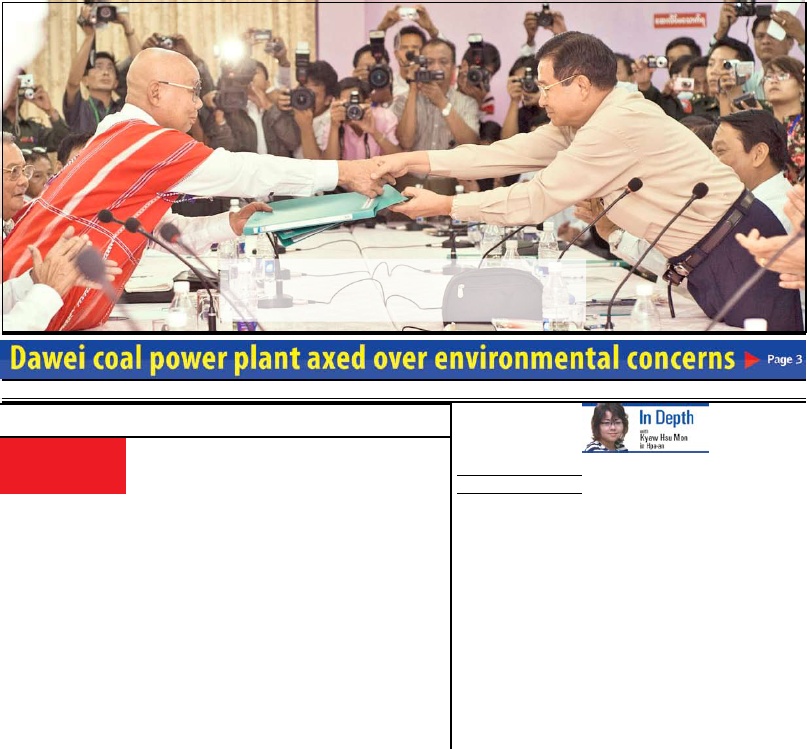






C
omment
the
M
yanMar
t
iMes
2
January 16 - 22, 2012
By Derek Tonkin
IN April 2009, the EuropeanUnion’s General Affairs Councilissued its “Conclusions on Burma/ Myanmar”. These stated that thecouncil “underlines its readinessto revise, amend or reinforce themeasures it has already adoptedin light of developments on theground. The Council reiteratesthat the EU stands ready torespond positively to genuineprogress in Burma/Myanmar.”Despite the progress of the pastsix months, the EU has hardlylived up to its promise “to respondpositively to genuine progress”.There have been no concessions,apart from a sleight of hand inthe EU Foreign Affairs Council April 2011 review of policy thatadded some 24 civilian membersof the new government to thesanctions list and a few pageslater in the same documentsuspended action against themfor 12 months.Indeed, during his January 5-6visit to Myanmar, British ForeignSecretary William Hague set outthe new rules of the game, andgave only a general indication of where the dismantled goalpostshave now been set up. All“political prisoners” must firstbe released, there must be anend to human rights abuses bythe army, humanitarian accessto areas of ethnic conflict and“visibly” free and fair polls whenby-elections are held in April.Only then will the UK recommendto the EU that “restrictivemeasures”, including the denialof development aid, which couldbe costing the Myanmar people asmuch as US$2.5 billion annually,might be mitigated.This all or nothing approachis a denial of classical diplomacyin which the calibration of response is of the essence. It isalso a denial of the principles of engagement and reward set outin EU statements over the years.British officials have reportedlysaid that Myanmar could meetthe conditions now demandedby the time of the meeting of theForeign Affairs Council reviewof policy in April. But who is tosay when these conditions havebeen met?One reason for moving thegoalposts is that the changesthat have occurred owe little ornothing to Western pressures,but are essentially home-grown.To acknowledge this too openlycould lead to a loss of face. For theWestern psyche, it is importantto recoup something from thepolicy failures of the last 23years. To insist on measures –further pre-conditions for theremoval of sanctions – which theMyanmar leadership have saidthey intend to take in any caseis an attractive option. Somehow,credit has to be claimed for thereforms.During his January visit MrHague might have replicatedsome of the confidence-buildingmeasures that Hillary Clintonhad announced during her visitin December, such as a relaxationof restrictions on technicalassistance by internationalfinancial institutions. The UK seemingly continues to discouragetourism, trade and investment,although Daw Aung San SuuKyi told Fergal Keane in a
BBC
interview on January 5 that“economic engagement is notnecessarily linked with sanctions”and that, as regards investmentby British companies, “we’vemade it quite clear that we’re keenon good investments, meaningnot just ethical investments butinvestments in fields where it isreally necessary”.This will be music to the earof those in the EU who take amore pro-active view of tradeand investment prospects inMyanmar than Mr Hague.“Really necessary” investmentwould surely include almostany responsible investment inthe public and private sectorsincluding tourism, transport,health, education, manufacturingand financial services suchas banking and insurance.Reputational risk is fading fast. As for the Myanmar leadership,they may not have found MrHague’s visit all that rewarding.It hardly strengthened thereformist group now in office.I suspect though that theleadership were well aware thatthey would get no change out of Mr Hague’s visit and may havedecided to get it over with as soonas possible.They could reasonablycongratulate themselves on theirrapprochement with financierand philanthropist George Soros,who has agreed to set up officein Myanmar. They are alsopreparing to receive their arch-critic in the US, Senator MitchMcConnell, the highly influentialRepublican Senator for Kentuckyand Minority Leader.Daw Aung San Suu Kyi hashowever made it clear that sheis prepared to take politicalrisks. Not so Mr Hague, whocan now report to the Houseof Commons how he left theMyanmar leadership in no doubtat all about what is expected of them. That was, after all, thepurpose of his visit.(
Derek Tonkin is a former British ambassador to Thailandand Vietnam and is chairmanof the non-profit organisation Network Myanmar (www.networkmyanmar.org).
)
UK moves the goalposts on sanctions
British Foreign Secretary William Hague at a press conference in Yangon on January 6.
Pic: Boo Thee
By Aung Tun
TODAY when we talk about thepolitical situation in Myanmar, oneof the words we hear most frequentlyis “irreversible”, in the sense that weshould not go back to military rule. It’snot only the international communitythat holds this view; I think I can speakfor the majority of people in Myanmarwhen I say we hope the changes of thepast year are permanent.But a critical question is what exactlyneeds to be “irreversible”. Thailandprovides an example. Our neighbour hasfaced many military coups in their past– something like 10 since 1932 – butthe country has consistently returned tocivilian rule, with no need for economicsanctions or boycotts. So what’s thedifference between us and Thailand?Thailand has a different politicalculture, in which, for the most part, themilitary does its job and the civilianadministration focuses on governing.Whenever there is a shift frommilitary rule to democracy, it needsto be accompanied by military reform.Indonesia since the end of Suharto’srule in 1997 provides a good example of how the military can exit politics. It’s akey reason why we don’t hear questionsbeing raised about whether changes inIndonesia are “irreversible”. Instead, thecountry is widely lauded as a beacon of democracy in the region.Similarly, the democratisationprocess taking place in Myanmar nowalso needs to include the developmentof a new political culture in whichthe military, civilian government,parliament, opposition, civil society andthe public play different but nonethelessimportant roles. This will create a largernumber of strong institutions withindependent voices that will ultimatelylead to greater political stability.How can we make this happen?First, political stakeholders, especiallyPresident U Thein Sein and hisgovernment, the opposition and themilitary leadership need to havea common understanding of thedirection in which the country isheading. At the moment, they seem tohave that understanding. However, itwill take more than this for us to beable to use the word “irreversible”.Here, the international community,especially the West, has an importantrole to play. Myanmar has beenisolated for almost five decadesbut is at a critical juncture in itsrelations with many nations. It wantsto improve relations with a broadrange of countries and this givesthe international community moreleverage than before. In the pastit appeared only China had muchleverage. Not surprisingly, Chinaused that advantage to meet its ownneeds.The West also has its economicreasons for wanting to improve tieswith Myanmar. However, it also hasan obvious interest in improving thelives of the Myanmar people, which iswhy it’s already engaged to some extentthrough non-government and socialorganisations. This kind of engagementneeds to be increased. More broadly, it’stime for the West to use its leverage tomake reforms “irreversible” througheconomic engagement, capacity building,direct development aid, facilitatingdialogue between opposing groups andanything else that is likely to lead to amore open society.In this regard, the recent visit byUnited Secretary of State HillaryClinton, should be widely welcomed. Forme, the most positive aspect of her visitwas a pledge to engage in education,health and other social projects throughcivil society groups. Additionally, sheagreed to look at much-needed capacity-building programs, which will beessential if we are to manage the manyissues we now face.The recent improvement in relationsdoesn’t mean that we will come to relyon the West. We have been strugglingon our own for a long time, and willprobably continue to do so for some time.However, the current situation providesan opportunity for the internationalcommunity to do the right thing by thepeople of Myanmar.(
Aung Tun has formerly workedat
The Myanmar Times
and non- government organisation Proximity Designs and is currently a research fellow at Myanmar Egress, a Yangon-based t raining centre and policythinktank.
)
With help from the West, no turning back
The Mail Box
Got something to say? We want to hear from you. Address allcorrespondence to the Editor,
The Myanmar Times
(English). Weendeavour to respond to all correspondencei n a timely manner.Address: 379-383, Bo Aung Kyaw Street, Kyauktada township,Yangon. Telephone: (+951) 392-928, 253-642Fax: (+951) 392-706Email:
your.myanmar.times@gmail.com
Dear editor,I WISH to welcome andthank you for opening acomments column in
The Myanmar Times
.It is a very goodopportunity for us toexpress our opinionsand comments freelywithout offending others– an opportunity thatwe have not had for somany years. It is a goodidea and the right time tointroduce this as we aremoving steadily toward ademocratic state.Myo Lwin(Mawrawady),Mayangone township, YangonDear editor,I HAVE been workingin tourism in Myanmarfor many years andmany foreign visitorsare interested to knowmore about the country’shistory and Bogyoke AungSan. I visited the Bogyoke Aung San Museum abouteight years ago and thinkwell worth visiting.Unfortunately it is nowclosed and it would benice if it can be visitedmore often in the future.Does anybody knowwhy it is closed and if it is possible to makeappointments to visit?Edwin Briels
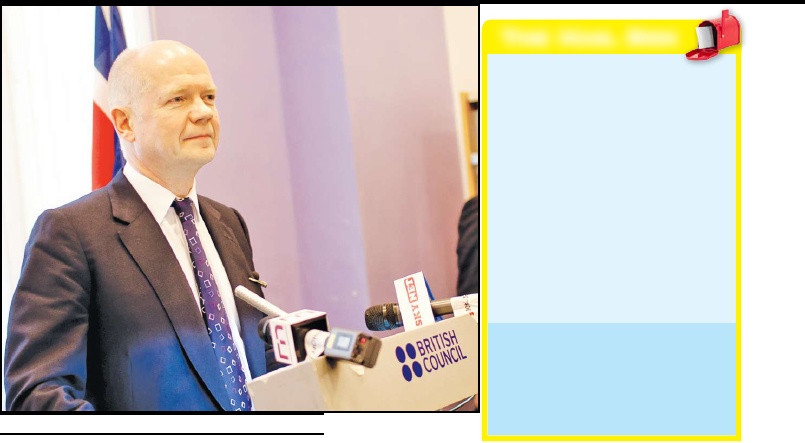




n
ews
3
the
M
yanMar
t
iMes
January 16 - 22, 2012
By Juliet Shwe Gaung
ENVIRONMENTAL activists appearto have notched another victoryover foreign investors, after thegovernment announced last weekthat a planned 4000-megawatt coalpower plant in Dawei would not goahead.U Khin Maung Soe, Minister of Electric Power 2, told journalist onJanuary 9 at the Yangon ElectricitySupply Board headquarters in Ahlonetownship that the ministries of energy, industry and electric power1 and 2 had “already decided” not toallow the plant to go ahead.The minister said the cancellationwas due to “fear of the adverse effectson the environment”.“We saw journals publishingarticles on the adverse effects of thecoal-fired power plant. We read themand decided that we should not doit,” he said.However, he said the ministrieswere still discussing whether toallow a 400MW coal plant at thespecial economic zone in TanintharyiRegion.“We are sure we will not work onthe 4000MW plant. However, we needa 400MW to support the [project] andwe are discussing whether to go aheadwith it or not. We are asking theministry that handles environmentalwork to do some calculations andconsider it,” he said.Ratchaburi Electricity GeneratingHolding was to build the 4000MWplant under a memorandum of understanding it signed with Italian-Thai Development, the developerof the special economic zone, inNovember 2011.However, the power plant cameup against stiff opposition from someDawei residents, who in Decemberorganised a press conference in Yangon to voice their concerns tolocal media.Ko Myo Aung, a social workerand Dawei resident, said he hopedthe government did not allow anycoal-fired power plants to be built.He said the power plant wouldmostly be for the benefit of foreign-owned industry.“It is not that we don’t want tosee development of our region butbuilding a coal-fired power plant inour region is like someone makinga fire and cooking rice in front of our house and serving the cookedrice to another village. The ricebeing cooked near us will not beserved to us,” he said.News of the cancellation surprisedthe project's investors, who onlytwo days earlier had travelledto Myanmar to meet governmentofficials.Ratchaburi president NoppolMilinthanggoon said his companyhad not received official notificationfrom the government of thecancellation.The
Bangkok Post
reported thatinvestors were confident the powerplant would still be built, possiblyusing a cleaner fuel. A spokesperson from the YangonElectricity Supply Board confirmedthe Dawei project could insteadbe powered by natural gas orconnected to the national electricitygrid.The cancellation has also raisedconcerns about the investmentclimate at a time when thegovernment is trying to attract moreforeign investment. It also comesafter the government suspendedwork on the unpopular MyitsoneDam in Kachin State, angering theproject’s Chinese backers.Meanwhile, Union Minister UKhin Maung Soe ruled out coalbeing used to power the Thilawaspecial economic zone in YangonRegion.“We will have a 500 MW gasturbine instead ... we will be ableto get enough gas by about 2015,”said U Khin Maung Soe.“We will not build power plantsthat have a bad effect on theenvironment. The head of thegovernment also asked us to buildhydropower and gas-powered plantsinstead,” he said.
See page 16 for more coverageon this issue
Govt cuts coalplant fromDawei project
By Zaw Win Than
TOURIST arrivals hit a recordhigh for the second year runningin 2011, rising more than 20percent, figures from the Ministryof Hotels and Tourism show.The number of foreign visitorsarriving through the Yangongateway increased 21.76pc to359,359, up from 295,147 in 2010.More than two-thirds of visitorswere from Asian countries,including about 59,010 fromThailand, the largest single group,followed by China with 32,757. About 18,925 visitors were fromSouth Korea.European nationals accountedfor 65,367 travellers, representing22.15pc of total arrivals. Franceled the way with 13,102 visitors,followed by Germany (10,932) andthe United Kingdom (7195).The figures also showed a sharp44pc rise in people arriving onbusiness visas, which are countedas tourist arrivals. Businesstravellers made up 69,943,or almost 20pc, of all foreignvisitors in 2011, up from 48,549the previous year. Meanwhile,foreigners arriving on social visasclimbed about 20pc to 33,273. A ministry spokesperson said thegrowth was based on Myanmar’srich cultural heritage andunspoiled natural landscapes.He said the ministry wasworking to set up strategies thatensured tourism developed ina sustainable and responsiblemanner and the government alsowanted to see tourism flourish.“We are aware of the importanceof smooth facilitation of travelfor international visitors andthe government has recentlyformed the committee for smoothentrance of foreign visitors,”he said. “The government’slong-term tourism objectivesare to develop the industry togenerate revenue, to create jobopportunities and create incomefor residents.”The increase, however, hasshown up the limited capacity of Myanmar’s tourism infrastructure,particularly hotels and domesticairlines.“Arrival numbers are increasing20pc to 30pc every year. It meanswe need to build more hotels,expand airlines and develop ourinfrastructure so we can offer abetter level of service to visitors,”said U Lynn Zaw Wai Mang,general manager of Unique AsiaTravel in Yangon.The ministry spokespersonsaid government was promotingexisting tourism destinationsthrough the upgrading of tourism-related infrastructureand facilities and improvingawareness through print material,such as tourism guidebooks,brochures and leaflets.“We were also able to establisha Pacific Asia Travel Association(PATA) Myanmar Chapter inNovember … we will continueto promote our tourism industrythrough PATA’s activities in thefuture.”
Tourist, business arrivals upagain in 2011, says ministry
Tourists take a pony cart around Bagan in early November.
Pic: Kaung Htet
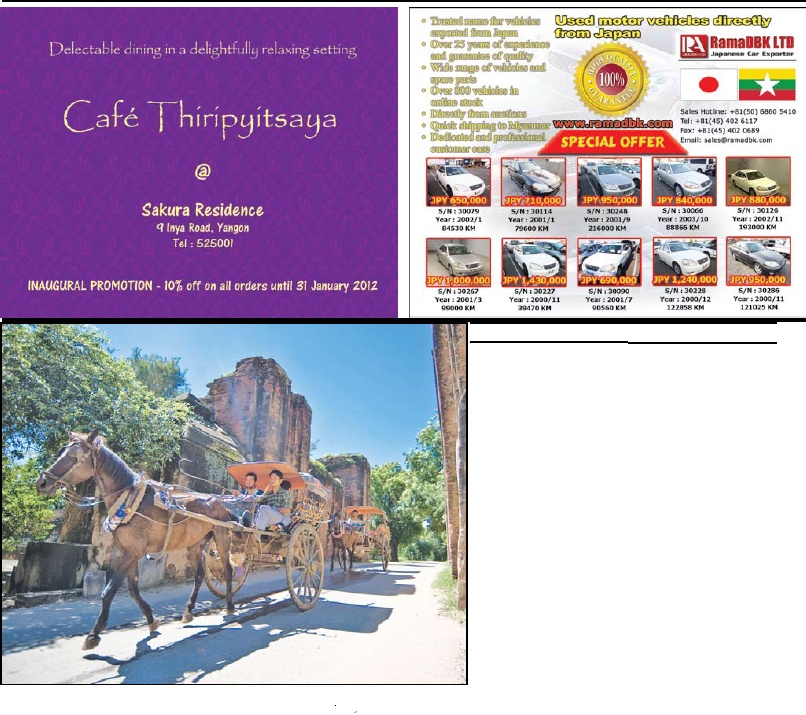




検索履歴:
結果00中00
00結果次の結果
p.
Notes
Post Note
